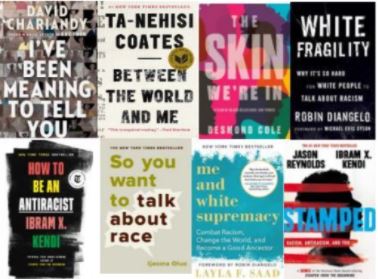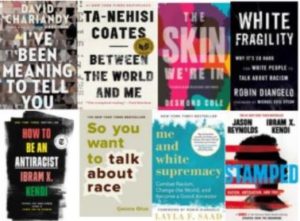As a human geographer, I have always gravitated towards issues related to the human experience. The impacts of geography on people. A multiple perspectives lens is firmly part of my practice. I have always been curious about perspective and how it can be represented and interpreted through literature, art, music and film. In my practice I have sought to educate students on the myriad of ways they can cultivate perspective and strive for interdisciplinary understanding whenever possible. If you had asked me a year ago if I taught through a lens of diversity, equity and inclusion, I probably would have said “yes”. What I have learned, (and am still learning, for I know that I will never be done…) since the death of George Floyd, a American Black man who died in police custody in Minneapolis on May 25, 2020 is that I need to go deeper. WAY deeper. Working to understand and learn through a multiple perspectives approach is one thing. But working to learn and understand through, and about experience, is quite another.
Perspective: a particular attitude toward or way of regarding something; a point of view. – Oxford Dictionary
Experience: direct observation of or participation in events as a basis of knowledge – Merriam Webster Dictionary
When the call went out to our faculty late last spring for volunteers to lead a book club discussion of one of five books that were curated for us to read, I volunteered. That simple act raised many questions for me. The book I chose was ‘Between the World and Me’ by Ta-Nehisi Coates. Subconsciously, (though I couldn’t have articulated it this way at the time) I knew I wanted to read about the experience of being Black. This book is a letter from Ta-Nehisi to his son, an intimate family conversation that the reader has been invited into. The events detail the Black experience in a way that is personal, familial and familiar to many, if not all Black families. It provides, for the reader, a chance to see the architecture of how we have come to this place, this moment of reckoning in our history through a detailed documentation and reflection on one man’s experience. It was this that I was after, although other titles were more historic in nature and could have filled some of the gaps in my own ‘Eurocentric’ history education of the 1980s. I wondered about the use of reading anything remotely resembling a history text on this topic as a place to begin. Who’s experience would be included? Whose would not?
Having decided on this book, I then wondered about what I would do once I had read the book. I was simultaneously aware of what a stereotype I had the potential to become. Tre Johnson’s June 12, 2020 article for The Washington Post was entitled “When Black people are in pain, white people just join book clubs.”
I take to heart Johnson’s words:
“The right acknowledgement of Black justice, humanity, freedom and happiness won’t be found in your book clubs, protest signs, chalk talks or organizational statements. It will be found in your earnest willingness to dismantle systems that stand in our way – be they at your job, in your social network, your neighbourhood associations, your family or your home. It’s not just about amplifying our voices, it’s about investing in them and in our businesses, education, political representation, power, housing and art.”
Something else that gave me pause as I signed up to facilitate this book club was the idea that I should even be a facilitator. I certainly didn’t / don’t feel qualified to take on such a role, and I was afraid someone would call me out. Through that fear though, I learned about the difference between calling out and calling in.
“Call-ins are agreements between people who work together to consciously help each other expand their perspectives. They encourage us to recognize our requirements for growth, to admit our mistakes and to commit to doing better.”
This is something I felt on board with as a facilitator who is still learning. I recognize now in hindsight, that perhaps at this entry point into the conversation, having a non-expert facilitator (and I was upfront about this) may have made it more palatable to own our clumsiness and to make meaningful commitments to accountability. View our book club’s Padlet of ‘Actionable Shifts in Practice’ HERE. I would say that from our 4 month (5 meeting) book club, there was a noticeable development in our comfort with using the language of diversity, equity and inclusion and that having a space for us to practice these conversations before bringing them to our students served to enhance our confidence. At a certain point though, I feel that we should move to hire Black facilitators for the work of deepening our understanding and contexts of the texts we read. This should not become a voluntary expectation of our Black colleagues.
“ A book club can provide a richer experience than just reading a book – a setting in which to practice having those tough conversations, other people to call you on your errors, and solidarity to strengthen your dedication. And, temptingly, it can mingle the tough intellectual work with social connection. This balance of joyful togetherness and political engagement can be valuable.” (Fallon, 2020)
I certainly found this to be true of our collegial book club; it became a learning space that reflected one of our highest values as an institution; the creation of community. This is where I feel the collegial book club challenges Johnson’s notion of book clubs as a”‘comfortable gathering of friends”. In this context, we have to be intentional about not just creating groups that satisfy our comfort levels, we need to ensure that there is room for discomfort, deep learning and accountability.
And so, circling back to the beginning of this post … what will I do after I read the book?
The focus of professional work within my sphere of influence is naturally curriculum review. I am interested in learning more about the respectful design of curriculum that includes decolonizing approaches to learning. There is a lot for me to learn there. If I can get back to perspectives vs experience for a moment, I think about how I want to do this work. This is where the Design educator in me comes back to the book club – and selecting reads that will heighten my empathy for the BlPOC experience. I feel this is an important first step because while it may often be true that “…book clubs are comfortable gatherings of friends who are unlikely to nudge one another to the places of discomfort that these books, at their best, demand.” (Johnson, 2020) my experience in facilitating our book club was exactly the opposite, and more. It did serve as a nudge, and an invitation to be vulnerable and uncomfortable, but also to be brave. See HERE for an ‘invitation’ to a brave space. I think this was largely the result of having established some group Essential Agreements ahead of time that we reviewed each meeting and adjusted as need be.
To consider a redesign of my curriculum that centers the experience of ALL my students, I must marinate first, in empathy for the BIPOC experience. I feel comfortable talking and teaching about perspectives, as that can be siloed in a rather intellectual way. To learn to empathize with the BIPOC experience, is the first step required of me as an educator now.
As Claire Fallon says,
“Buying a book isn’t revolutionary; it’s easy, even a bit indulgent. In one sense, it’s a consumerist response to a crisis that calls for something deeper: putting bodies on the line.”
For me, starting this work in my sphere began amongst my colleagues, in a book club. I see this work as a continuum, it starts with developing empathy and rooting my understanding of the BIPOC experience in our shared humanity. As my empathy grows, my knowledge expands, my choices change, and my confidence propels me to act and invest in ways that dismantle systemic racism.
The book club is just the catalyst for the work that needs to be done, it is not an end in itself.
Fallon, Claire. “Can a Book Club Fight Racism?” Huffington Post, 19 Aug. 2020.
Johnson, Tre. “When Black People are in Pain, White People Just Join Book Clubs.” The Washington Post, 12 June 2020.
Feature Photo Credit: Branksome Hall Senior Library


So well done ACR! Thanks for your vulnerability, and the wise approach that has emerged from your thoughtful reading.
The book club is a great place to continue the thinking with others. Thanks, too, for your generosity with this initiative.
Garth.
@acampbellrogers, thank you for sharing the experience of facilitating a DEI book club! I really appreciate and resonate with your final comment on how developing empathy for BIPOC experience is really only a first step to making meaningful and compassion choices to dismantle racism. I think what also helps me visualize my journey is from Anima Leadership’s spiral framework, the idea being that progress isn’t linear, and will toggle back and forth between different phases of competency and spheres of influence. Thanks again and hope I get to be part of your book club someday 🙂
Esther